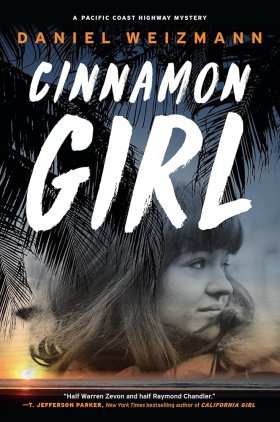“Kip’ll be right out. I’m gonna fix us some drinks. You’ll try our health shake, I hope?”
“Sure,” I said, suddenly keenly aware from his timbre that I was in the presence of radio royalty.
“It’s coconut,” he said, “good stuff. Sit, sit.”
I stepped in and he shut the door, locked it and retreated to a back bar/kitchen area. I was trapped in the lair. All around was lushness, more exotica, big palm fronds drooping over the sunburst furniture, tiki masks, carved shields. And dead center, a framed photo of Kip ‘n’ Rog seated in a swank restaurant with a slightly puffy, aging Elvis. Any visitor would receive this central piece of information: they had broken bread with the King.
Stan “Kip” Kipler came from another back room brandishing a poster.
“Your uncle tells us you’re a fan.”
I said, “Absolutely,” wondering who told them that.
He unrolled it—a giant ad for Shotgun Sixties at Six on Sirius FM. “Proof you met us.”
I thanked him—what else could I do?
Rog came out with glass goblets of white liquid and some almonds on a big silver tray. He took his place at the twin yellow arm chairs and now they were side by side, like pilots ready for takeoff.
“Where’d you find that thing?” Rog said.
“It’s the next to last one,” Kip replied.
“Lucky guy—free poster.”
“What? Kid drives all the way down here for Uncle Marty, he’s earned a poster in my book.”
“If you say so. Just don’t sell it on eBay,” Rog warned.
“Oh no, I wouldn’t, I—”
“He’s teasing you,” Kip chimed in. “Don’t listen to this noodge.”
They were both DJ Handsome—which is to say, good-looking, but with an unevenness in the features that prevents being on camera for a living. Both dressed like they had money to blow on casual clothes. And they both wore gold Rolexes.
But that’s where the similarities ended.
Kip was short, like maybe five-four, sprightly, and restless in his seat, full of groom-bearded gung ho, a craggy Jewish troll, a grotto creature, a seeker of shade and moisture, nibbling from his vase of almonds, snickering and munching and exfoliating. Yet as creaturely as he was, he also seemed like the more direct of the two men. Rog was remote, receding into his own tallness, cowboy cautious with a single wave of salt-and-pepper comb-back and boyish blue class-clown eyes that promised big resistance.
Rog was the boundaries; Kip was the action—he pulled out a silver Sharpie.
“Adam, right?”
“That’s right,” I said.
He was about to sign when he stopped himself and put down the pen.
“By the way, what did your uncle tell you about Fountain Grove?”
“Just that he loves it,” I said. “So far, I mean. It seems like a special—”
Rog leaned back. “What we do here at Fountain Grove is—”
“We aren’t a high-priced nursing home.”
“This isn’t a spa.”
“The really sharp older folks come to us for—”
“We like to see it as a kind of late-in-life cleanse.”
“But instead of cleansing your abdomen or whatever, which we also do, by the way, here we cleanse the spirit.”
I said, “Wow,” as if on cue—their banter ping-ponged like they were talking for some third party behind me—the callers out there, John Q. Public.
I shot a glance at Elvis and looked back at them. “You know,” I said, stretching an arm out to get pretend-comfortable, “it’s kind of a funny coincidence, but I actually grew up with a guy who dated a girl who knew you guys during the K-Earth days.”
“Zat right?”
“Yeah—Cynthia Persky?”
Long faces, radio silence.
“Her nickname was Cinnamon,” I added.
No reaction—cold.
Then, Kip to Rog: “You remember a Cinnamon Persky?”

























